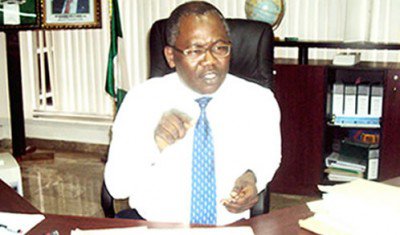Mohammed Bello Adoke, attorney-general of the federation and minister of justice from 2010-2015, has been in the news over the controversial OPL 245 block awarded to Malabu Oil and Gas. The Economic and Financial Crimes Commission (EFCC) has filed charges against him but Adoke, who is currently on self-exile, told TheCable in an email interview that he did no wrong. He said it is some powerful interests that are using the anti-graft agency to persecute him.
TheCable: Your name has featured prominently in the investigations into the Malabu Oil/OPL 245 affair. What exactly are the issues in this messy deal?
Mohammed Adoke: The Malabu issue has been in existence since 1998. I want to take it from 1998 because I have seen that in recent times, the EFCC has taken up interest in the matter with a view to persecuting me. In order to make me look bad they have deliberately bifurcated the transaction and have chosen to present the issues from 2010 when I became involved in the settlement. However,the transaction started in 1998, when the military administration of General Sani Abacha came up with the policy of encouraging indigenous participation in the upstream sector of the oil and gas industry. They allocated oil blocks to indigenous companies on discretionary basis at a reduced signature bonus of $20 million. The beneficiaries include Malabu Oil and Gas Ltd, South Atlantic Petroleum Ltd (owned by Theophilus Danjuma) and Famfa Oil Ltd (Folorunsho Alakija). Malabu was allocated OPL 245 and they made a part-payment of $2 million for the signature bonus and brought in Shell as technical partners. Things seemed to be going on smoothly. Gen. Abacha died and Gen. Abdulsalami Abubakar came in, and things continued. And then he handed over power to Gen. Olusegun Obasanjo in 1999.
Sometime in 2001, due to circumstances not very clear but which the principal actors in government at the time can best explain, the federal government revoked OPL 245 from Malabu, whose beneficial owner was Chief Dan Etete, among others. It will be recalled that Etete was minister of petroleum when the oil block was awarded to Malabu in 1998. The administration of President Obasanjo then invited some international oil companies (IOCs) to bid for the Block 245. Shell participated and won the bid. The signature bonus was now $210 million. Malabu felt short-changed that Shell, its technical partner, had acted irresponsibly. Shell as technical partner to Malabu already had insider knowledge of the block. Malabu petitioned the house of representatives who then conducted a public hearing into the transaction and concluded that the revocation of the block from Malabu and reallocation to Shell was done mala fide (in bad faith) and declared it null and void. It therefore passed a resolution that the block should be returned to Malabu.
Government did not comply with the resolution, so Malabu went to court and there was a series of litigation between Malabu and the FGN until sometime in 2006 when they entered into an out-of-court settlement which was subsequently reduced to a consent judgment of the federal high court, Abuja under the tenure of the then attorney-general of the federation, Chief Bayo Ojo, SAN. As a result of the agreement and all the conditions set out to be met by all parties, Chief Edmund Daukoru, who was then the minister of state for petroleum resources, wrote on behalf of the FGN, and on behalf of the president and commander-in-chief of the armed forces, and who incidentally was the minister of petroleum, Chief Olusegun Obasanjo, GCFR, to convey the decision to return the block 100% to Malabu in accordance with the terms of settlement.
TheCable: But Shell went to court to challenge it…
Adoke: Shell was dissatisfied with the return of OPL 245 to Malabu and commenced arbitration before the International Centre for Settlement of Investment Disputes (ICSID) which is an organ of the World Bank for the settlement of investor/state disputes. This matter was ongoing when President Umaru Musa Yar’Adua came into power in 2007. He set up an inter-ministerial committee to try to resolve this dispute between Shell, Malabu and FGN. Shell at that time offered to pay Malabu $500 million in addition to giving them some percentage of shares in the block. For some reason, the agreement had not been signed when President Yar’Adua died. In 2010, Malabu wrote a letter to President Goodluck Jonathan, GCFR, to complain that there was an agreement between them and FGN that was yet to be implemented. The president sent the letter to me to examine and advise. Based on this, I went through all the documents. I did due diligence on all the legal aspects and found a subsisting consent judgment of the federal high court and the settlement agreement between the parties which was executed on the 30th November 2006 and therefore advised that the judgment was enforceable. That is how I came into the OPL 245 picture.
TheCable: Is that all there was to your involvement?
Adoke: Well, President Jonathan approved my recommendation and endorsed a copy of the approval to myself and the honourable minister of petroleum resources for implementation. After that, the minister of petroleum issued the licence to Malabu. After the issuance of licence, Malabu was expected to pay the signature bonus within a period of 180 days. While Malabu was going around looking for technical partners because they were not ready to deal with Shell again, Shell, relying on its dominant position in the industry, issued a caveat to other IOCs that it had interest in OPL 245. This prevented other IOCs from pursuing their own interest in the block or entering into a working relationship with with Malabu. As a result, Malabu could not move forward, and neither could Shell. Indeed, Shell was trying to claim over $2 billion from the federal government. It claimed to have spent over $500 million on the block. They also listed loss of revenue and claimed damages.
TheCable: But did Shell have any genuine claims?
Adoke: If you look very well at the situation, we were in a dilemma. Why? Shell itself knew that this block was a problematic block to the extent that there was a pending litigation in court at the instance of Malabu in 2001. That is why they did not pay the entire signature bonus when they were initially allocated the block by the Obasanjo administration. They paid $1 million into the federal government account and paid the remaining $209 million into an escrow account jointly managed, please note, jointly managed, by both Shell and the federal government of Nigeria. A Shell representative was a signatory to that account while the minister of state for finance and the accountant-general of the federation were the signatories on behalf of the FGN. The three signatories were therefore required to approve any disbursement from the escrow account.
TheCable: But since Shell was aware of the pending litigation, why did they go into the transaction at all?
Adoke: Shell will have to explain that, but I guess they had reasonable assurances that they would be allocated the block and that made them go ahead to de-risk the block. If not, they wouldn’t have gone ahead to de-risk and they would not have had any claims against the government of Nigeria. They were obviously working with assurances then. But with Shell having gone ahead to de-risk the block, the same federal government revoked the block and gave it back to Malabu with a promise to give Shell another oil block with commensurate value. But Shell said they had spent so much money on de-risking OPL 245 and that was the basis of their arbitral claim. They saw the reallocation an as expropriation of their own asset. That was what made it investor/state arbitration. These are all the issues that my persecutors are hiding from the public and they are trying to bifurcate it by only treating it as an issue of 2010 when I advised on the enforceability of the judgment on the basis of which President Goodluck Ebele Jonathan, GCFR, approved its implementation in order to honour the agreement reached with Malabu.
After President Jonathan returned Block 245 to Malabu, ENI of Italy began to show interest in partnering with Malabu. ENI approached Shell with a proposal to partner and jointly acquire the oil block from Malabu. ENI approached the government to confirm if the allocation to Malabu was genuine and we authenticated it on the strength of the documents before us. They now came back with Shell and said they wanted to jointly acquire it but there had been a breakdown of confidence and respect between Malabu and Shell following years of legal battles. As a result of the mutual suspicion, they needed a third party to come in and help broker the deal. Shell did not trust Malabu and Malabu did not trust Shell. And here was ENI coming in as a partner with Shell. If that atmosphere of distrust did not exist, the involvement of the FGN would not have been necessary. All that would have been required was FGN’s consent to Malabu to assign the oil block to Shell and ENI.
We agreed to negotiate a settlement between Shell and Malabu on the condition that they would withdraw their arbitral proceedings against FGN. Shell in compliance with our demands terminated the arbitration. All the parties came together and negotiated directly, a committee was constituted involving officials of NNPC, Directorate of Petroleum Resources, the Federal Inland Revenue Service, State House counsel and officials of the ministry of justice. They sat down for two to three days, negotiated all the agreements, and they sorted things out. After the requisite presidential approval was obtained, the final Resolution Agreement on OPL 245 was signed by the minister of petroleum resources (Diezani Alison-Madueke), the finance minister at that time (Segun Aganga), myself as the chief law officer and attorney-general, the group managing director of NNPC, and all the departments, agencies and ministries of government directly responsible in dealing with this issue were duly represented. This was well captured in the public hearing by the house of representatives in 2013. The copy of the report is there in the national assembly. We all played our respective roles in order to give effect to the transaction. But today, the impression out there is that only Adoke knew about it and was solely responsible for the transaction, but that is a story for another day.
The president was duly briefed about the transaction, about what has taken place, about the $210 million signature bonus that was to be paid, which had already been warehoused since 2001 by Shell in an escrow account jointly managed with the federal government. Shell wrote to say they were satisfied with the agreement and then signed off their own portion of the instruction that the federal government should take the $209 million in the escrow account in addition to the $1 million it had already paid in 2001. The minister of state for finance and the accountant-general of the federation signed off their own portions after the approval of the president. Shell and ENI were to pay $1.1 billion to Malabu to buy the block off them.
TheCable: In essence, you authorised the transaction and the president signed off on it?
Adoke: No, I did not. I only conveyed the approval of the president to all the parties. Those are two different things. I did not authorise the transaction as I was not a signatory but only conveyed the president’s approval
Adapted from The Cable

